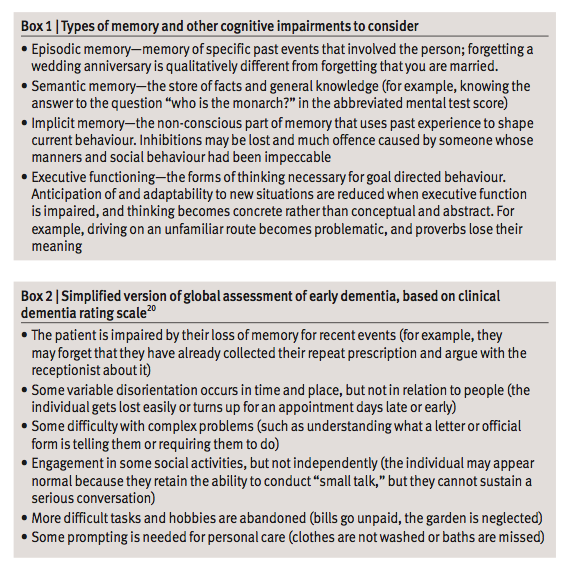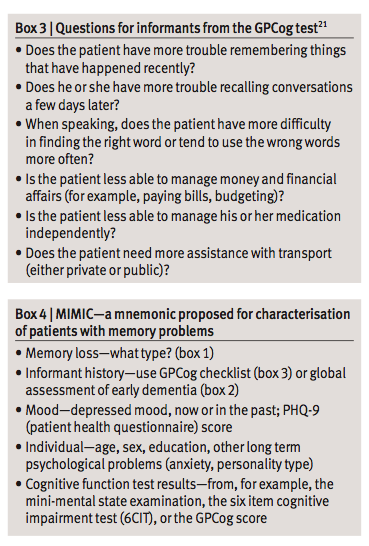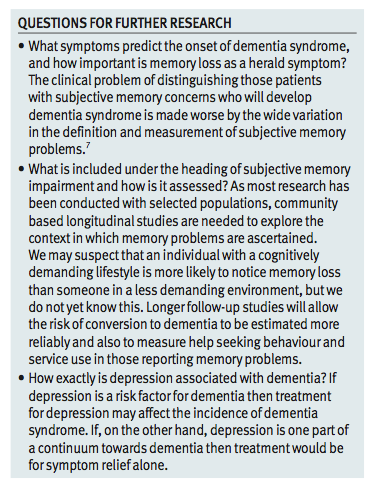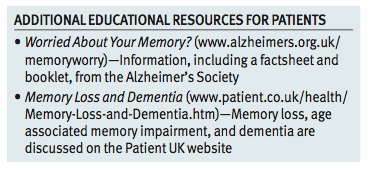Summary points
- Subjective memory problems are much more common in later life than the objective problems that suggest minor cognitive impairment or dementia
- Subjective memory problems are not simply a characteristic of the "worried well" and should be taken seriously
- Depression is associated with subjective memory problems, as are older age, female sex, and low educational attainment
- Depression is itself a risk factor for dementia, making the diagnostic task even more difficult
- Subjective memory problems are a poor predictor of dementia syndrome (loss of memory and one other aspect of cognition sufficient to cause impairment)
- When deciding whether to refer to specialist services, practitioners need to rely on rules of thumb to evaluate the extent and possible significance of symptoms or subjective memory loss
Are subjective memory problems associated with concurrent objective memory impairment?
In the most recent review, eight studies with a pooled population of 9148 reported the rate of subjective memory problems in patients with dementia, seven reported the rate in those with mild cognitive impairment, and of these four compared the rates in dementia and mild cognitive impairment head to head. Subjective memory problems were reported by 43% of those with known dementia and 38% of those with known mild cognitive impairment. Across the spectrum of cognitive impairment (mild cognitive impairment or dementia) 40% of patients had subjective memory problems compared with 17% in healthy adult controls. In this review the pooled sensitivity of subjective memory problems for prediction of dementia was 43% and the specificity was 86%. For mild cognitive impairment, the pooled sensitivity was 37% and specificity was 87%. In cross sectional community studies people with subjective memory problems only had 20-30% probability of concurrently having either dementia or mild cognitive impairment.
Even with direct questioning, 60% of those with dementia and 62% of those with mild cognitive impairment do not report simple memory problems, suggesting that loss of awareness of change occurs early in cognitive impairment. If general practitioners asked directly about problems with memory the majority of the patient group they were trying to identify would deny any difficulty, whereas 17% of healthy adults would answer positively.
Are subjective memory problems a risk factor for developing dementia?
Most longitudinal studies have shown that patients with subjective memory problems have an increased risk of future cognitive decline or dementia. The risk of developing dementia if subjective memory problems are present varies, and studies use different methods to ascertain subjective and objective impairment. For example, in the Adult Changes of Thought study of 1883 people aged 65 and older, a subset with normal cognition at baseline but high levels of subjective memory problems were nearly three times more likely to develop dementia than their asymptomatic peers (odds ratio 2.7, 95% CI 1.45 to 4.98).
Baseline cognitive impairment may be an important factor for progression to dementia in patients with subjective memory problems. In a study of 364 community dwelling older people without dementia, those who reported subjective memory problems at follow-up and not at baseline were nearly five times more likely to have significant cognitive impairment than those without subjective memory problems at follow-up (odds ratio 4.5, 95% CI 1.3 to 15.4). However, not all longitudinal studies support the view that subjective memory problems are associated with an increased risk of developing dementia. The Maastricht Aging Study, which involved 557 participants aged 55 to 85 years, showed that although being forgetful might indicate slower general information processing and delayed recall at baseline, it did not predict cognitive change over six years.









 留言列表
留言列表
 線上藥物查詢
線上藥物查詢 